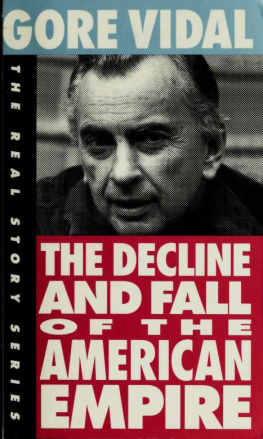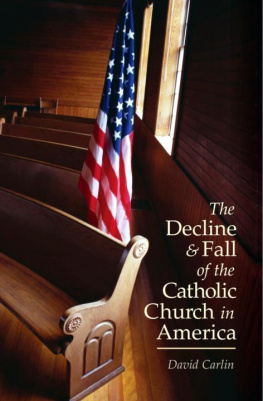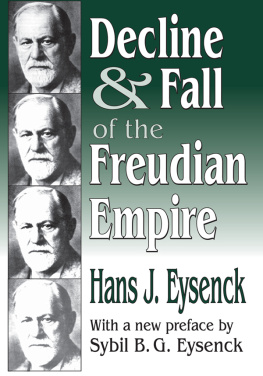Will Cuppy - The Decline and Fall of Practically Everybody (Nonpareil Books)
Here you can read online Will Cuppy - The Decline and Fall of Practically Everybody (Nonpareil Books) full text of the book (entire story) in english for free. Download pdf and epub, get meaning, cover and reviews about this ebook. year: 1998, publisher: David R. Godine, Publisher, genre: Detective and thriller. Description of the work, (preface) as well as reviews are available. Best literature library LitArk.com created for fans of good reading and offers a wide selection of genres:
Romance novel
Science fiction
Adventure
Detective
Science
History
Home and family
Prose
Art
Politics
Computer
Non-fiction
Religion
Business
Children
Humor
Choose a favorite category and find really read worthwhile books. Enjoy immersion in the world of imagination, feel the emotions of the characters or learn something new for yourself, make an fascinating discovery.
- Book:The Decline and Fall of Practically Everybody (Nonpareil Books)
- Author:
- Publisher:David R. Godine, Publisher
- Genre:
- Year:1998
- Rating:4 / 5
- Favourites:Add to favourites
- Your mark:
- 80
- 1
- 2
- 3
- 4
- 5
The Decline and Fall of Practically Everybody (Nonpareil Books): summary, description and annotation
We offer to read an annotation, description, summary or preface (depends on what the author of the book "The Decline and Fall of Practically Everybody (Nonpareil Books)" wrote himself). If you haven't found the necessary information about the book — write in the comments, we will try to find it.
The Decline and Fall of Practically Everybody (Nonpareil Books) — read online for free the complete book (whole text) full work
Below is the text of the book, divided by pages. System saving the place of the last page read, allows you to conveniently read the book "The Decline and Fall of Practically Everybody (Nonpareil Books)" online for free, without having to search again every time where you left off. Put a bookmark, and you can go to the page where you finished reading at any time.
Font size:
Interval:
Bookmark:

This is a Nonpareil Book,
published in 1984 by
DAVID R. GODINE Publisher
Post Office Box 450
Jaffrey, New Hampshire 03542
www.godine.com
First published in 1950 by Henry Holt and Company
Copyright 1950 by Fred Feldkamp
Afterword copyright 1984 by Thomas Maeder
All rights reserved.
No part of this book may be used or reproduced in any manner whatsoever without written permission, except in the case of brief excerpts embodied in critical articles and reviews. For information, contact Permissions, David R. Godine, Publisher, Fifteen Court Square, Suite 320, Boston, Massachusetts 02108.
For permission to publish his little pieces in book form the author thanks The New Yorker and the late lamented For Men. Neither of these magazines had anything to do with the new and rather daring article entitled And I Ought to Know.
LIBRARY OF CONGRESS
CATALOGING-IN-PUBLICATION DATA
Cuppy, Will, 18841949
The decline and fall of practically everybody.
Reprint. Originally published: New York: Holt C1950
1. History Comic, satirical, etc.
I. Feldkamp, Fred. II. Title
D10.C871984902'.0783-48892
PAPERBACK ISBN 978-1-56792-377-3
EBOOK ISBN 978-1-56792-473-2

WHEN WILL CUPPY died, in September 1949, he had been working on this book, off and on, for sixteen years. During most of that time, of course, he was busy with other projects a weekly column of reviews of mystery books for the New York Herald Tribune, pieces for various magazines, and a series of books on birds, mammals, reptiles, and fish.
The first of these animal books, How to Tell Your Friends from the Apes, appeared in 1931 and set the pattern for the others that followed. Cuppy often complained that people kept asking him, Dont you ever write anything but little pieces about animals?
Here is the answer: all the time this was really the book he was most concerned about. At his death, he was well on his way toward finishing it.
As published, The Decline and Fall of Practically Everybody includes chapters devoted to all the famous men and women of history Cuppy wanted to include. (He had worked on all, some at least in skeleton form, before his death.) A few general chapters are missing: he planned to set down his thoughts on where he stood on Betsy Ross, and various other topics which were, for Cuppy, matters of immediate moment. In their place his pieces on the humor and eating habits of the great have been added.
Perhaps a note on how Cuppy worked would be of interest to his readers. First of all, before writing a line on any topic or even thinking about what he might write he would read every volume and article on the subject that he could find including, in many cases, obscure books no longer available in this country. This was standard operating procedure, whether the topic in question was the Giant Ground Sloth or Catherine the Great.
After having absorbed this exhaustive amount of material, he would make notes on little 3-by-5 index cards, which he would then file under the appropriate subheading in a cardfile box. Usually he would amass hundreds and hundreds of these cards in several boxes, before beginning to block out his piece. In some cases, he would read more than twenty-five thick volumes before writing a one-thousand-word piece. Cuppy felt that he must know his subject as thoroughly as was humanly possible before going to work on it.
Sometimes Cuppy would stay in his Greenwich Village apartment for weeks at a time, having food sent in as needed. The apartment overflowed with books in bookshelves along all living room walls right up to the ceiling, in his bedroom, and even in the kitchen over the refrigerator, on top of the stove, and on the supply shelves.
Usually his day would start in the late afternoon. After several cups of coffee, he was ready to start sorting cards, or writing notes to himself. Hed work until about eight or nine, then take a nap until midnight, when hed fix himself dinner generally hamburger, green peas, and coffee. While enjoying his second and third cups of coffee he would phone his few close friends often his only contact with the outside world. Then back to work till five, six, seven, or eight in the morning.
These, he discovered, were the quietest hours in the Village apartment which he inhabited during the last twenty years of his life. Cuppy hated noise in all forms, and throughout those twenty years he was tortured daily by the sounds which issued from a school playground directly adjoining the building in which he lived. From his small terrace he was also subjected to the wailing of numerous babies in nearby buildings. Yet he never thought of moving. His only positive action against these young adversaries was to buy a New Years Eve noisemaker the kind that uncoils when you blow into it. When he couldnt stand the wailing another minute, hed get out his noisemaker and blow it several times in the direction of the crying child. Then he felt better.
When he grew irritated with the adults with whom he had to deal in his writing assignments, he would compose devastating letters to the offender or offenders, address the envelopes, apply the stamps, and leave the letters on the table near his door, to be mailed. Then the next day he would tear them up.
Beneath the gruff exterior he often affected, Cuppy was a thoroughly generous, kindly human being. He pretended he hated people, and, in fact, he was genuinely uneasy about meeting new people he was afraid they might not like him or that theyd take up a lot of his time. His friends, though, were constantly receiving funny little presents from kaleidoscopes to hen-shaped milk-glass salt cellars. His Christmas cards were sent out around July 4; their good wishes applied either to the previous Christmas or to the coming one, however his friends chose to regard the matter.
His two favorite places on earth were the Bronx Zoo, where he felt really relaxed, and his shack, Chez Cuppy (or Tottering-on-the-Brink), on Joness Island, a few miles east of Jones Beach. Here Cuppy would revert to his earlier days as a hermit, sometimes for several weeks at a stretch. The trip was too much trouble for just a weekend, since Cuppy would have to carry, in large suitcases, a sizable supply of canned goods, books, and index-card-file boxes.
Cuppy has a devoted following, in England and Australia as well as in this country, but he was convinced that no one had ever heard of him. Any evidence to the contrary pleased him very much. The high point of his life, he once said, was the moment when he was walking along Park Avenue with Gene Tunney, then heavyweight champion of the world, and someone passing said to her companion, Why, theres Will Cuppy.
But Cuppy was often equally set up by a lack of recognition. I know he would have been delighted by the error on the part of the newspaper to which he had contributed for twenty years, in its early morning editions following his death. The picture labeled Will Cuppy accompanying the obituary was of someone else.
On Cuppys death I inherited the job of assembling his material for publication. Except for the war years, I had been in almost daily communication with Cuppy by phone ever since he started on this book in the summer of 1933. These talks always concerned whatever he was working on at the moment.
Sometimes, before the call was completed, there might be a brief reference to some happening in the days news. But Cuppy really wasnt interested in the front pages of the daily papers. Anything that happened after the eighteenth century left him cold. In fact, the farther back in history he went, the more his enthusiasm grew.
Font size:
Interval:
Bookmark:
Similar books «The Decline and Fall of Practically Everybody (Nonpareil Books)»
Look at similar books to The Decline and Fall of Practically Everybody (Nonpareil Books). We have selected literature similar in name and meaning in the hope of providing readers with more options to find new, interesting, not yet read works.
Discussion, reviews of the book The Decline and Fall of Practically Everybody (Nonpareil Books) and just readers' own opinions. Leave your comments, write what you think about the work, its meaning or the main characters. Specify what exactly you liked and what you didn't like, and why you think so.












